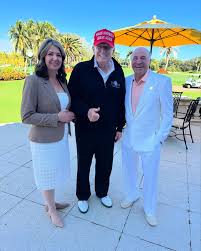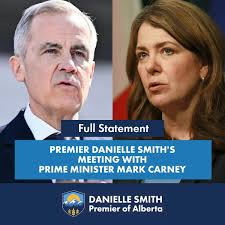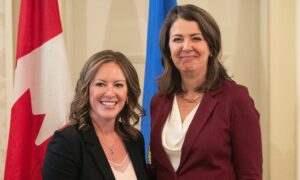Note to readers: The comments section below is now functioning. Please feel free to comment on any of my scribbling. I would like to hear what you think.
Background
In a June 2023 article in The Conversation I raised the question “Will Danielle Smith veer back to the right and towards Alberta separatism?” At the time, a month after Smith’s United Conservative Party won the general election, I argued that Alberta had an economic and financial “ace in the hole”- Alberta’s vast export surplus driven by conventional and unconventional oil. Alberta separation would mean that Canadians’ standard of living would drop significantly as would the Canadian dollar. I also noted that, unlike Quebec Inc., the ownership of Alberta’s fossil fuel-based economy is largely controlled by American financial interests. I predicted more confrontation with the federal government, building institutional and economic fences around the province, and selective government privatizations.
Since then, it has become clearer that Smith remains out of sync with other provincial premiers in responding to Donald Trump’s on-again, off-again tariffs. Smith and her cabinet colleague Rebecca Schulz have since the provincial election ratcheted up the rhetoric especially around the emissions “production cap” representing a thorn in Smith’s drive to double the province’s bitumen production.

Since Mark Carney’s coronation and election call she has continued to belabour the issue of the Liberals’ decade-long “disastrous” management of the Canadian economy and its deliberate attempt to keep Alberta’s oil in the ground.
Last week Jeremy Appel of The Orchard broke a story about a newly re-minted political party’s push for a referendum on separation before the next provincial election. Appel, who is a tireless-working independent journalist, learned that the Republican Party of Alberta had compiled a “scorecard” on each MLA’s position on this independence referendum. Eleven members of the UCP caucus have expressed support for a referendum on Alberta separating from Canada. Five ministers are included in the list below.
- Eric Bouchard (Calgary-Lougheed)
- Scott Cyr (Bonnyville-Cold Lake-St. Paul)
- Devin Dreeshen, Minister of Transportation (Innisfail-Sylvan Lake)
- Shane Getson (Lac Ste. Anne-Parkland)
- Jennifer Johnson (Lacombe-Ponoka)
- Martin Long, Minister of Infrastructure (West Yellowhead)
- Ric McIver, Minister of Municipal Affairs (Calgary-Hays)
- Dale Nally, Minister of Service Alberta and Red Tape Reduction (Morinville-St. Albert)
- Chelsae Petrovic (Livingstone-Macleod)
- Angela Pitt (Airdrie-East)
- Rajan Sawhney Minister of Advanced Education (Calgary-North West)
(For a look at the party’s website and referendum strategy click here.) Notably Premier Smith did not support a referendum at this stage. However, with the re-election of the Carney Liberals she has again reloaded her rhetorical bazooka.

At the same time, polling by the Angus Reed Institute shows, in the face of Trump’s assault on Canada’s sovereignty, three in ten Albertans and 33 per cent of Saskatchewan residents say they’d like to leave if the Liberals form the next government. (The survey was conducted online from March 20 – 24, 2025, among a randomized sample of 2,400 Canadian adults who are members of Angus Reid Forum.) A driving factor in separatist sentiment appears to be the feeling that the province is not “respected” by the rest of the country. However, this sentiment has fallen significantly throughout the country since last September, possibly because of threats emanating from Washington.
Recent polling by Nanos Research shows that a majority of Canadians across regions and demographic groups believe that talk about western separatism should be taken seriously. The poll surveyed 1345 persons from April 11 and 13 and came after an explosive Globe and Mail op-ed by Preston Manning the previous week. In the Prairies 37.4% of respondents felt western separatism should be taken “very seriously,” while 26.1% said it should be taken “somewhat seriously.” While this poll is not a vote on separation, it does suggest that we will be hearing more about western separatism- and the centre of this foment is undoubtedly Alberta and Saskatchewan.
March and April media tracking
This post and Part 2 tracks recent media interactions with Premier Smith and the many news releases demonstrating Ms. Smith is “standing up” strongly for Alberta, in particular her hyper-partisan address in the Legislative Assembly. It is Smith’s choice of words that reveals bias to separatism as a “reasonable” option to position Alberta’s United Conservative Party.
Smith is following a playbook from separatists in Quebec. Many Albertans claim, perhaps justifiably, that the majority French-speaking province has been able to leverage federal politicians for more than its fair share of federal dollars. Smith has been more aggressive than Jason Kenney in attacking the federal government and was actively meddling in the federal election claiming a return of a Liberal government would unleash an “unprecedented national unity crisis.”
I begin with Premier Smith’s U.S. tariff update of 7 March in which she advocated that Washington “abide by the terms of the CUSMA while the election is held and then commence negotiations shortly thereafter with whomever ends up becoming Canada’s new Prime Minister.”
Breitbart
This was followed the next day with a much-criticized Breitbart interview with Matthew Boyle. Criticism centred on whether she was supporting the U.S. in a trade war and her support for Pierre Poilievre “being in sync” with the Trump administration (pro-development, low taxes, “anti-woke”). She spoke favourably about greater integration with the U.S. referring several times to Alberta being the “Texas of the North.” However, she did characterize the U.S. tariffs as “unjust and unfair.” To the question about Canadian interest in joining the U.S., she likened the current tariff turmoil to Canada’s united response to the 1890 tariffs of President McKinley, mistakenly referring to the construction of the CPR as one of the Canadian responses. Smith also supported more defence integration to protect the Artic.
Contra Ottawa
Several days later, she and Environment minister Rebecca Schulz issued a joint statement called “The truth about the federal emission cap.” They mischaracterized the report of the Parliamentary Budget Officer as a “scathing analysis” of the damage to Canada ‘s economy
“For years, provinces, businesses, industry leaders, along with numerous independent reports, have found that the federal government’s proposed oil and gas emissions cap will hurt Canadians, damage our economy and cost jobs. Over and over, the federal government has dismissed and ignored these concerns. The purpose of the PBO report was to determine the impact on future production required under proposed oil and gas emissions cap regulations and the PBO’s “baseline scenario” for the 2030 to 2032 compliance period. Under the baseline scenario, maximum allowable emissions of 160 megatonnes (Mt) would be exceeded by 7.1 Mt annually, on average. The cut was estimated to cost $20-billionand eliminate 54,400 jobs from Canada’s economy
“Now the independent Parliamentary Budget Officer’s (PBO’s) scathing analysis shows, beyond a doubt, that this cap will hurt Canadians. It will cut oil and gas production by 5 per cent, or more than 245,000 barrels a day. It will e and cut $20 billion from our GDP by 2032, all while global emissions increase at the same time. But what the statement ignored was the statement
Not said, under the proposed regulations production is projected to be 11.1 per cent higher, on average, over 2030 to 2032 compared to current levels.
Smith and Schulz then went on to “urge the next elected Prime Minister to abandon this extreme and ideological cap” (emphasis added).

The Nine Demands
This broadside was then followed by Smith calling for a federal election with a set of Alberta’s demands, a prelude to the demands delivered personally to Prime Minister Carney a few days later.
These harmful, federal policies included:
-
The proposed emissions cap which continues to threaten our energy sector.
-
Bill C-69 which still hampers critical infrastructure projects.
-
Failed bail policies which continue to put our communities at risk, undermining the safety and security that Albertans deserve.
-
Gun bans that target law-abiding hunters and sport shooters.
-
Open border policies which are allowing over two million people per year to enter Canada.
-
The plastics ban which puts billions of dollars of investment and thousands of jobs at risk.
-
Bill C-59 which bans businesses from communicating about their environmental goals.
-
The electric vehicle mandate which calls for 100 percent of new vehicles sold to be electric by 2035.
-
The Sustainable Jobs Act, which aims to transition energy workers to a net zero economy as they work to shut down the energy sector.
In Part 2, I continue the media analysis with particular attention to her March 26th ministerial speech to the Legislative Assembly in which she ferociously attacked criticisms that her actions were treasonous. Smith’s rhetoric reached new heights with her fusillade directed at the newly victorious Liberals under Prime Minister Carney. This release included an ominous reference to to “discuss our province’s future, assess various options for strengthening and protecting our province against future hostile acts from Ottawa, and to ultimately choose a path forward.”